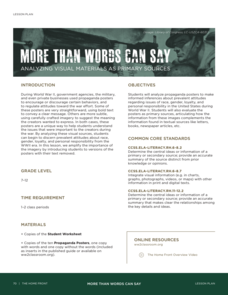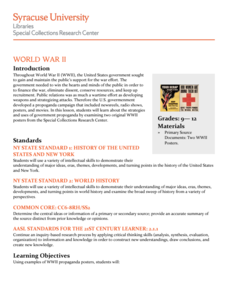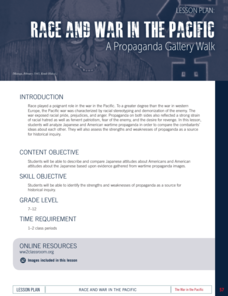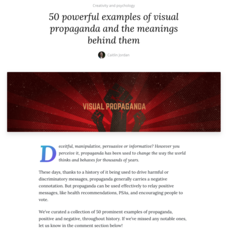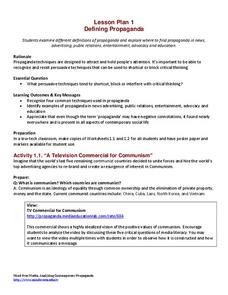Nemours KidsHealth
Media Literacy and Health: Grades 9-12
An essential skill for 21st-century learners is to know how to find reliable sources of information. Two activities help high schoolers learn how to determine the reliability of health-related news from websites, TV, magazines, or...
iCivics
Students Power Elections
A Students Power Elections resource guide provides would-be voters with the guidance they need to become voters. Included in the packet is information about voter registration and voting, how to research candidates and ballot measures,...
Encyclopedia Britannica
Candidate Flip-Flop or Evolution?
Beware political rhetoric! Connotation is everything! Groups select a presidential candidate and investigate how the candidate's position has changed on a specific issue. After analyzing the situation, the group determines whether they...
Encyclopedia Britannica
Campaign Photo Analysis
It's the art of the image! As part of a study of the 2020 Presidential race, groups analyze an image of a candidate, first from an objective point of view and then subjectively. They then prepare a presentation detailing what they...
National Woman's History Museum
Propaganda and Women's Suffrage
Americans who backed the suffragist movement used posters to gain the support of others for their cause. Class members analyze the visual imagery and propaganda devices used in a variety of these posters. In addition, groups examine how...
National WWII Museum
More Than Words Can Say: Analyzing Visual Materials as Primary Sources
The propaganda of World War II was a key factor in galvanizing the home front. Class members examine images—without their text—to consider their messages, including those around race and gender. Using pictures and discussion questions,...
Syracuse University
World War II
During World War II propaganda was as important to the war effort as the soldiers in the field. Scholars consider how the government communicated messages of patriotism with propaganda by examining pieces from World War II. Then, they...
National WWII Museum
Race and War in the Pacific: A Propaganda Gallery Walk
Race played a key role in the war in the Pacific during World War II. Using images from both American and Japanese sources, learners consider racial propaganda and how leaders used it to rally popular support during the conflict. After...
Echoes & Reflections
Antisemitism
Propaganda and anti-semitism were linked to evil ends during the Holocaust. Using video testimony of Holocaust survivors, examples of Nazi propaganda, and discussion questions, learners explore the roots of anti-semitism in Europe and...
The New York Times
Teaching Orwell and '1984’ with the New York Times
Doublethink and alternate facts? Big Brother and Facebook? 1984 and 2019? Sales of 1984 have surged and so has the use of George Orwell's dystopian classic in classrooms. Whether new to teaching the novel or a seasoned veteran you'll...
Alberta Learning
Creating Persuasive and Effective Visuals
Advertisers know how to use persuasive techniques to create powerful visuals that inform and influence others. Class members examine these techniques and then demonstrate their knowledge as they craft posters, flyers, collages, etc. for...
Canadian War Museum
Analyzing Propaganda Posters
Understanding propaganda is very similar to understanding advertising's influence on an audience. Teach learners all about effective propaganda tactics by analyzing posters from World War I. Pupils work together to make their own posters...
University of Pennsylvania
Decoding Propaganda: J’Accuse…! vs. J’Accuse…!
Reading snail mail is a great way to go back into history and to understand others' points of view. The resource, the second in a five-part unit, covers the Dreyfus Affair. Scholars, working in two different groups, read one letter and...
Canva
50 Powerful Examples of Visual Propaganda and the Meanings Behind Them
Propagandists have many tools at their disposal to influence thinking and behavior. Among the most powerful are the visual tools, posters designed to grab the attention and stir the emotions of viewers. Check out this collection of...
Facing History and Ourselves
The Nazis in Power: Propaganda and Conformity
The Nazis used the power of propaganda to encourage confirmative views and the discrimination of Jews. A social studies resource illustrates these issues through discussion, image analysis, and a writing exercise.
Film Education
Nineteen Eighty-Four: Orwell
Warning or prediction? Nineteen Eighty Four is the anchor text for a series of tasks that ask readers to compare the novel to the film as well as current events to those pictured in George Orwell's dystopian classic.
Centers for Disease Control and Prevention
Youth Exposure to Advertising and E-Cigarette Use
Vaping is increasingly popular with young people. Small wonder given the marketing strategies used by the companies that produce E-cigarettes and vaping flavors like menthol, chocolate, and candy. Check out an infographic that identifies...
University of Wisconsin
Analyzing Presidential Campaign Propaganda
Campaign propaganda has evolved from 1952 through the presidential election of 2008. A social studies activity prompts class members to analyze the devices used in ads and political cartoons, noting strategies they believe would work to...
Prestwick House
Understanding Language: Slant, Spin, and Bias in the News
We live in a time of fake news, alternative realities, and media bias. What could be more timely than an activity that asks class members to research how different sources report the same topic in the news?
Carolina K-12
Propaganda, Spin and Soundbite Politics
It's all about the spin! In an introduction to propaganda techniques and soundbite politics, scholars first learn about common propaganda techniques before seeing them in action in the context of the 2016 election cycle. Activities...
Media Education Lab
Sponsored Content as Propaganda
What is sponsored content? Who produces sponsored content? Why? Is it fair or unfair? What are the privacy implications for consumers? To answer these questions, class members view a model screencast before crafting their own that...
Media Education Lab
Propaganda Techniques
In an age of fake news, alternative facts, and biased reporting, it is more important than ever that 21st century learners develop the critical-thinking skills necessary to recognize, analyze and resist the propaganda techniques used in...
Media Education Lab
Defining Propaganda
21st century learners live in a media world. Help them develop the skills they need to be able to analyze the barrage of propaganda they face daily, with a resource that introduces them to the type of persuasive appeals found in news,...
National Association of Teacher Educators for Family and Consumer Science
Consumerism in the Classroom: Effective Strategies for Today's Teenage Consumers
Help class members become savvy consumers with a series of activities that has them analyzing marketing strategies, comparing the value of brand name versus off-brand clothing, and considering the advantages and disadvantages of shopping...







